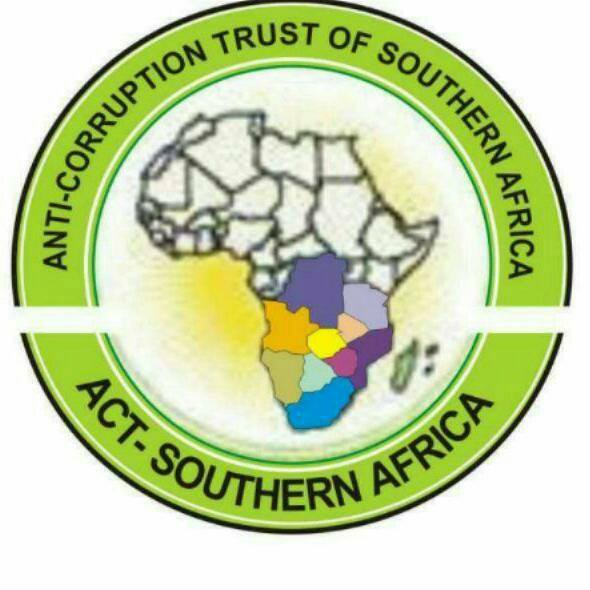Please present yourself
My name is Obert Chinhamo. I am the Director of the Anti-Corruption Trust of Southern Africa (ACT-SA) since 2016. I am the head of the Secretariat but work closely with the ACT-SA Board of Trustees chaired by Ms. Elizabeth Mangenje. It is the team spirit that makes ACT-SA more successful.
What motivates or inspires you to work in anti-corruption?
It is all about the impact that we make through our anti-corruption activities. For instance, one of the reports by ACT-SA on corruption in local authorities focusing on corruption at Gokwe Town Council drew the attention of several stakeholders that included the Zimbabwe Anti-Corruption Commission (ZACC), the Zimbabwe Republic Police (ZRP) and the parent Ministry of Local Government and National Housing among other stakeholders. ZACC and ZRP launched investigations that resulted in the arrest of the Town Secretary and the Director of Finance. The two were later dismissed from work based on the findings of ACT-SA investigations.
Furthermore, the Ministry of Local Government and National Housing which is the parent Ministry that supervises local authorities set up an Investigations Committee that confirmed all of the findings from the ACT-SA report. This shows that the views expressed by ACT-SA were listened to and recommendations were being followed. When such results are produced, we feel motivated and ‘soldier on’ the fight against corruption.
What is an anti-corruption achievement you are proud of?
ACT-SA is very proud of its contribution to the UNCAC Review Mechanism through its report on Zimbabwe’s implementation of Chapter II and V of the UNCAC. Furthermore, the reports that it produces through research efforts draw a lot of attention and sometimes lead to some reforms, a shining example being the ACT-SA report on corruption in local authorities in Zimbabwe.
What are your organization’s main goals?
ACT-SA is a registered non-governmental organisation that campaigns against corruption in both the private and public sectors.
ACT-SA envisions an “Accountable, transparent and legitimate public and private sector institutions operating alongside a well-informed, empowered and actively engaged citizenry.”
ACT-SA’s mission is to contribute to good governance and a corruption free and prosperous Southern Africa through: (1) Institutional capacity building, (2) Situational prevention of corruption, (3) Social prevention and public empowerment; (4) Anti-corruption policy and law reform and (5) Research, development and advocacy.
The main strategic goals, within which our programs and actions sit are:
- Social prevention and public empowerment: empower marginalized communities that bear the brunt of the negative effects of corruption, to speak out and take action as opposed to relying on outsiders for support. Through this goal, ACT-SA set up and empowered Community-based Anti-Corruption Monitoring Voluntary Action Groups (VAGs) that monitor, report and take action against corruption, maladministration and bad service delivery at the local level.
- Anti-corruption policy and law reform: ACT-SA analyses anti-corruption laws, policies and institutional arrangements in order to identify gaps and use the findings emanating therefrom, to inform its evidence-based advocacy.
- Access to Justice: improve access to justice to victims of corruption, targeting marginalized communities, especially women, youths, the disabled and those living with HIV and AIDS.
- Research, Development and Advocacy: contribute to anti-corruption knowledge generation, codification and advocacy for improved efficiency, effectiveness and impact of anti-corruption efforts.
- Regional Cooperation, Networking & Advocacy: strengthen the participation of civil society organisations and the private sector in ending corruption.
How does your organization operate?
ACT-SA is a regional organisation with a mandate to work in Southern Africa. As a common law trust, it is administered by a team of Trustees drawn from a diversity of professionals who have a wealth of experience in anti-corruption, governance, law, management, human rights, and constitutionalism among other competencies. The board is supported by a Secretariat that enjoys a wealth of experience in anti-corruption research, management, law and governance at the national, regional and international levels. In addition, ACT-SA works closely with many other organizations to achieve its objectives.
What are the biggest successes your organization has accomplished in the field of anti-corruption in the past years?
The following are some of ACT-SA’s achievements:
Community Empowerment against Corruption Project: ACT-SA received support from the Canada Fund for Local Initiatives (CFLI), to empower communities to monitor, report and take action against corruption, maladministration and bad service delivery. Community Anti-Corruption Monitoring Voluntary Action Groups (VAGs) were set up and trained in Kwekwe, Gokwe, Gweru, Zhombe, Tiger Reef, Shurugwi, Zvishavane, Masvingo, Mutare, Harare, Chinhoyi, Victoria Falls, Bulawayo and Beitbridge.
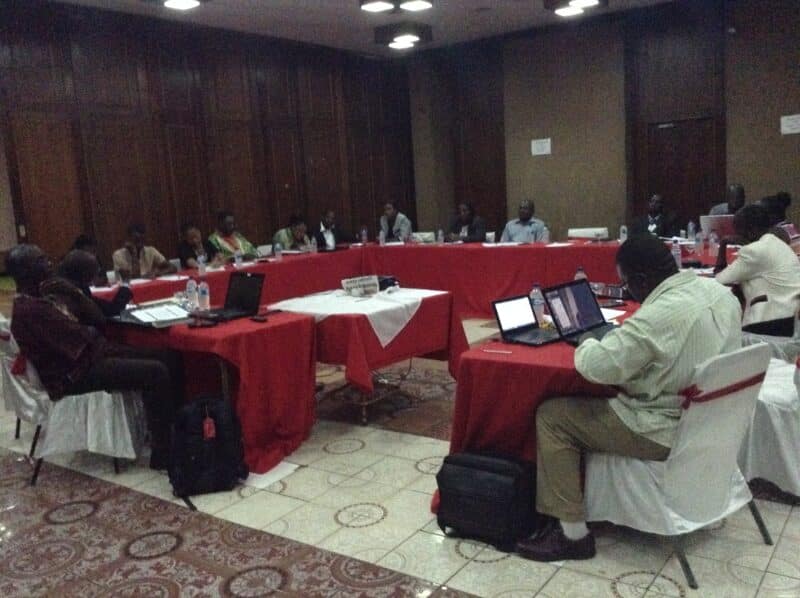
Zimbabwe Schools/Colleges/Universities Anti-Corruption Project: ACT-SA has in its structure a Youth Desk which is responsible for conducting anti-corruption trainings in schools, colleges and universities. The Youth Desk successfully set up School Anti-Corruption Clubs in secondary schools.
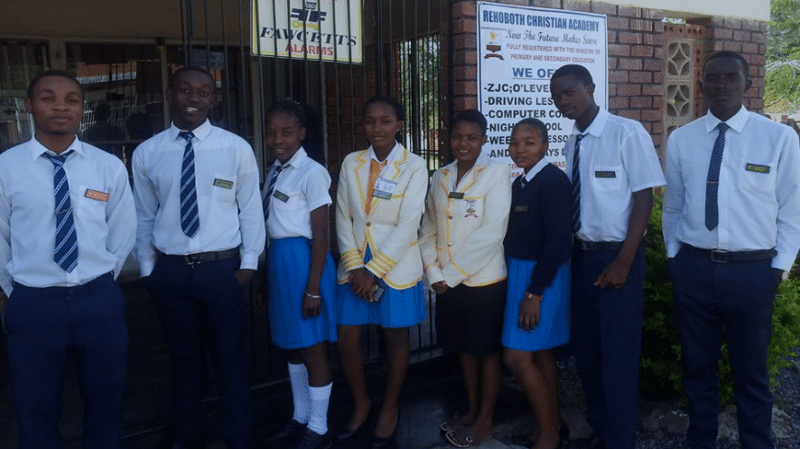
Business against Corruption Project: ACT-SA empowered micro, and small to medium enterprises to resist and report corruption. The project was supported by UNODC. Through the project, ACT-SA developed a Model Internal Anti-Corruption Policy for the business sector. Furthermore, ACT-SA facilitated the setting up of SMEs Anti-Corruption Forums in Kwekwe, Gweru and Zvishavane as pilot districts.
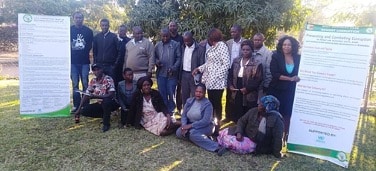
Anti-Corruption Advice and Court Monitoring: ACT-SA has a team of lawyers and paralegals who give free anti-corruption advice to members of the public. Most of the cases received by ACT-SA are referred to different authorities for investigations and appropriate action. In addition, ACT-SA introduced ‘Suggestion Boxes’ that have been installed in Kwekwe, Gokwe, Masvingo and Zvishavane to encourage members of the public to anonymously report corruption without being detected.
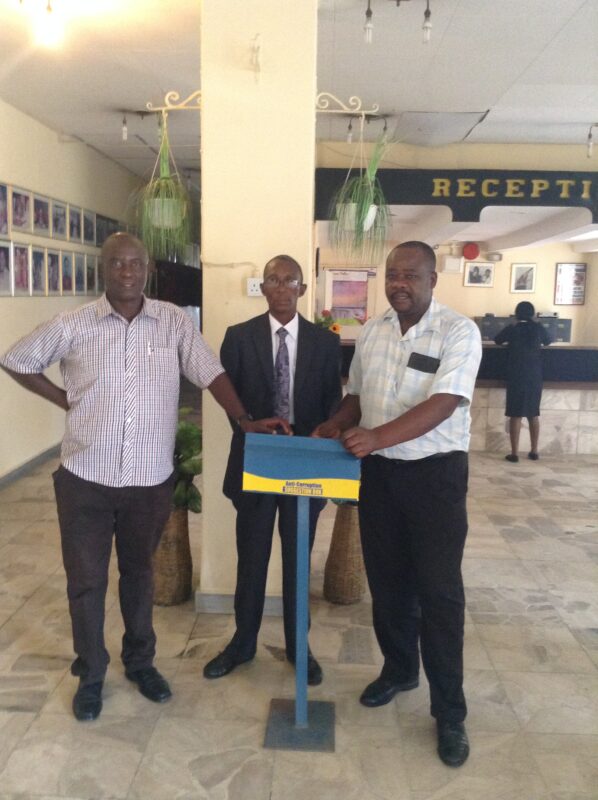
Advocacy for Anti-Corruption Treaty Signature, Ratification and Domestication Project: ACT-SA monitors and reports on progress made by the Southern Africa Development Community (SADC) Member States vis-à-vis the signature, ratification and domestication of the SADC Protocol against Corruption, the AU Convention on Preventing and Combating Corruption and the UNCAC.
What are the key challenges specific to your local context which your organization faces?
It is indisputable that the organisation has great ideas on anti-corruption but the realization of its vision is often hampered by the lack of resources. Funding is a huge obstacle militating against the realization of its goals. ACT-SA also faces challenges of funding. The secretariat has been battling a serious financial challenge to carry its work and it has been pushing back programming.
Furthermore, its Board members, staff and volunteers often receive threats from corrupt syndicates and sometimes from law enforcement agents and other government entities.
In addition, the operating environment in Zimbabwe is hostile and there are attempts by the government to outlaw civil society organisations through an NGO Amendment Bill currently at the advanced stage of promulgation. During the month of January 2023, at least 270 civil society organisations were deregistered and asked to surrender registration certificates to the government. It is this roguish nature of the government that makes the entire civil society family uncomfortable.
Another challenge is the endemic nature of corruption, both grand and petty. In Zimbabwe, corruption is so entrenched that it has become a culture. The top leadership that is expected to be exemplary is often implicated in corruption scandals in which millions of dollars are lost. A number of integrity institutions themselves are also implicated in corruption which leaves everyone wondering on who shall then ‘guard the guard’, when institutions expected to be fighting corruption are themselves corrupt.
There is also a challenge of intimidation by state security agents and threats for arrests that have been unfolding. In 2022 a member of our secretariat got information that the intelligence officers had listed our organization as an entity of interest, so as to follow its work that may be detrimental to government.
What can other organizations learn from you?
- ACT-SA is strictly non-political and independent and this has helped it fence off criticism.
- It works with other organizations and people and to mutually support each other’s work.
- All advocacy activities undertaken by ACT-SA are evidence-based.
- ACT-SA Board of Trustees comprises an equal number of men and women. The organisation is gender sensitive.
- ACT-SA has for a long period of time been relying on volunteers to make all the distinctive achievements highlighted above. The contributions of volunteers should not be underestimated.
- The organization has also been tapping on information supplied by whistleblowers under strict conditions of confidentiality. This has helped in ensuring that dark corners of society are unraveled in the ultimate endeavor to fight corruption.
- ACT-SA has been leading in collaborations and currently leads a coalition of CSOs totaling over twenty. This has resulted in a combined effort to fight corruption.
What have you learned from your organization’s work in anti-corruption that could be useful to others?
Base whatever you say or write on facts, especially when writing anti-corruption reports. Writing reports should not be an end in itself, but the reports should be used to support evidence-based advocacy. Also important in anti-corruption is team work and collective action: advocacy efforts pushed by a coalition make more impact as compared to those pursued by individuals.
To what extent has your organization been involved in the UNCAC Review Mechanism?
In 2021, ACT-SA produced a civil society parallel report on Zimbabwe’s implementation of Chapters II and V of the UNCAC. To increase consumption of the report, ACT-SA translated the same report into Shona and Ndebele languages that are spoken and understood by a larger population of Zimbabweans.
Why is it important for you and your organization to be a member of the UNCAC Coalition?
It gives immense opportunities for networking, exchanging of best practices and resource mobilization. In 2021, ACT-SA secured a grant from the UNCAC Coalition to produce the civil society parallel report. Furthermore, the UNCAC Coalition is such a valuable bank of knowledge on the UNCAC that we learn from it every day.
Is there something you would like to share that has not been mentioned?
In the Southern African region, ACT-SA chairs the Southern African Anti-Corruption Network (SAACoN) which is a network civil society anti-corruption against operating in Southern Africa.
ACT-SA also coordinates the Civil Society Organisations Initiative for Stolen Assets Recovery in Southern Africa (CSO-ISARSA) which comprises 16 civil society organisations drawn from 10 countries in Southern Africa. The CSO-ISARSA initiative seeks to:
- Raise awareness about, and generate demand for asset recovery among different government, civil society, communities and anti-corruption bodies in Southern Africa;
- Analyse and make suggestions for improving the laws, policies and institutional arrangements for effective prosecution of entities and individuals involved, and to enable the return of stolen assets and distribution of recovered assets;
- Support relevant authorities by identifying, reporting and exposing stolen assets;
- Advocate for asset recovery related investigations and prosecutions; and
- Engage in strategic litigation in selected cases, with at least five cases anticipated per country by the end of the project period.
In 2022, ACT-SA facilitated the setting up of the Zimbabwe Civil Society Anti-Corruption Coalition which comprises 23 Zimbabwean civil society organisations committed to anti-corruption.




